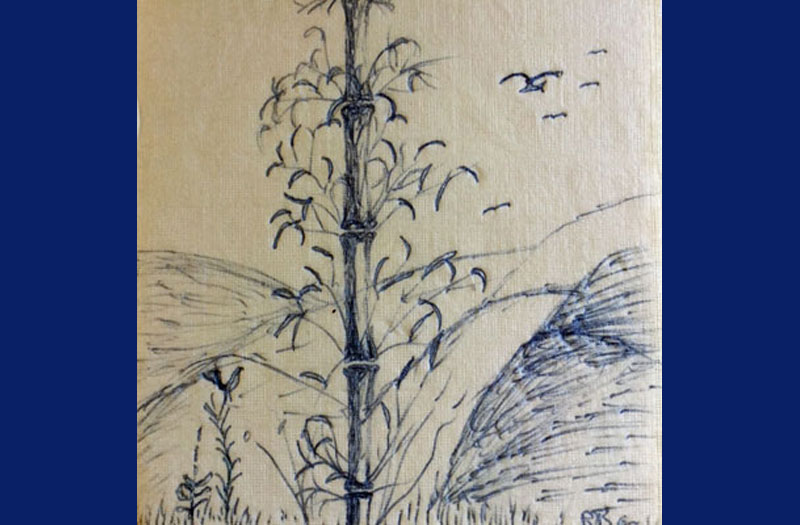[Click on BLUE links for sources and information]
Railway Travel. A journey in a railway train makes me sentimental. If I enter the compartment a robust-minded, cheerful youth, fresh and whistling from a walk by the sea, yet, as soon as I am settled down in one corner and the train is rattling along past fields, woods, towns, and painted stations, I find myself indulging in a saccharine sadness —very toothsome and jolly. I pull a long face and gaze out of the window wistfully and look sad. But I am really happy —and incredibly sentimental. The effect is produced, I suppose, by the quickly changing panoramic view of the country, and as I see everything sliding swiftly by, and feel myself being hurtled forward willy-nilly, I am sub-conscious of the flight of Time, of the eternal flux, of the trajectory of my own life. . . . Timid folk, of course, want some Rock of Ages, something static. They want life a mill pond rather than the torrent which it is, a homely affair of teacups and tabby cats rather than a dangerous expedition. W.N.P. Barbellion, The Journal of a Disappointed Man, An Intimate Edwardian Diary, 1919
In writing the previous Think in the Morning post (Road Tripping Toward World Peace) we discovered that we had much more to say. We will be posting Part II in awhile but until then we will post a few Interludes with additional information you might enjoy. In the last post we briefly mentioned the poet Kai Carlson-Wee and printed one of his poems. You can watch the movie he made, Riding the Highline, above.
I’ve always been interested in liminal spaces. There’s an energy there, a quality of anticipation mixed with grief. When you’re writing about a fixed place, either in terms of a physical place or a place in time, you start to limit your ability to invent reality. You become confined to the realism of the narrative, to the literal interpretation. There’s nothing wrong with realism, but one of the great powers poetry has is an ability to create reality outside of time. When you read a poem with a sharp metaphor or a wild association, there’s an energy created between two known things, or between two things that can be imagined, and this energy is completely unique and has the quality of the in-between. It works to suggest deeper layers of significance. When I go traveling without a fixed agenda—when I’m hopping trains or hiking off-trail in the mountains—I feel a similar kind of energy. The world reveals a larger aspect to me, a deeper meaning, and it feeds something essential in my spirit. In my twenties I went through a few serious depressions and the only two things that really helped me heal my mind were traveling and poetry. I don’t know the neurological reasons for this kind of healing, but I know it has something to do with existing in that liminal space, the sense of motion between two points, or as Kerouac wrote: “Nothing behind me, everything ahead of me, as is ever so on the road.” Kai Carlson-Wee
Riding a bicycle is another way to experience the sentimental feeling described in the top quote by Barbellion. Try Bicycle Diaries by David Byrne (mentioned here The Coffee Shop) and Sidewalks by Valeria Luiselli (mentioned here The Art of Empty Spaces).
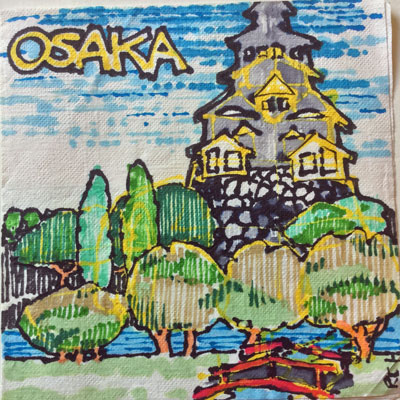
Sea Gull Cellar Bar Napkin Art, Roy Hoggard artist
If you are a fan of Jorge Luis Borges, you should take a look at Atlas, a book he wrote with his second wife María Kodama. It is a beautiful short book of photographs, poems, and short essays on places they travelled together. In the prologue, Borges comments:
To discover the unknown is not a prerogative of Sinbad, of Eric the Red, or of Copernicus. Each and every man is a discoverer. He begins by discovering bitterness, saltiness, concavity, smoothness, harshness, the seven colors of the rainbow and the twenty-some letters of the alphabet; he goes on to visages, maps, animals and stars. He ends with doubt, or with faith, and the almost total certainty of his own ignorance. Jorge Luis Borges, Atlas
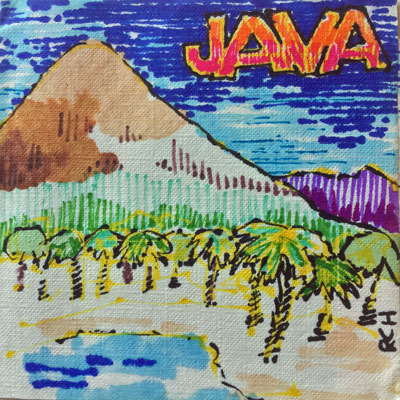
Sea Gull Cellar Bar Napkin Art, Roy Hoggard artist
Borges wrote a short piece on the impossibility of an exact map. Our human brains do not, cannot, know everything. For a long and rather complicated discussion of the point that Borges makes you could read a very good piece by Oscar Antonio di Marco titled Borges, The Quantum Theory and Parallel Universes. Or, you could read the one-page short story called On Exactitude in Science reprinted below from Jorge Luis Borges, Collected Fictions, translated by Andrew Hurley:
On Exactitude in Science
Jorge Luis Borges
… In that Empire, the Art of Cartography attained such Perfection that the map of a single Province occupied the entirety of a City, and the map of the Empire, the entirety of a Province. In time, those Unconscionable Maps no longer satisfied, and the Cartographers Guilds struck a Map of the Empire whose size was that of the Empire, and which coincided point for point with it. The following Generations, who were not so fond of the Study of Cartography as their Forebears had been, saw that that vast Map was Useless, and not without some Pitilessness was it, that they delivered it up to the Inclemencies of Sun and Winters. In the Deserts of the West, still today, there are Tattered Ruins of that Map, inhabited by Animals and Beggars; in all the Land there is no other Relic of the Disciplines of Geography.
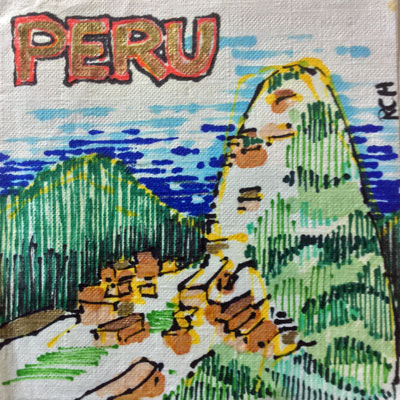
Sea Gull Cellar Bar Napkin Art, Roy Hoggard artist
Because there can be no complete map we make connections, metaphors; we are charmed by serendipity and make much of coincidences (fooled by randomness as Nassim Nicholas Taleb writes). I remember a good friend, Hanley Norins, who was in advertising (he wrote the Brylcreem Ad “A Little Dab ‘ill do ya”). He taught me about “brain-storming” sessions where to solve a problem a group of people just throw out wild ideas that are put down on a blackboard. Eventually the ideas coalesce into the solution. Genius.
Here is an odd example of some connections I got from my research on “traveling”. Borges quotes one of my favorite poets, William Blake, in his Atlas book. One of Blake’s comments in the Prophetic Books was:
Thank God I never was sent to school
To be Flogd into following the Style of a Fool
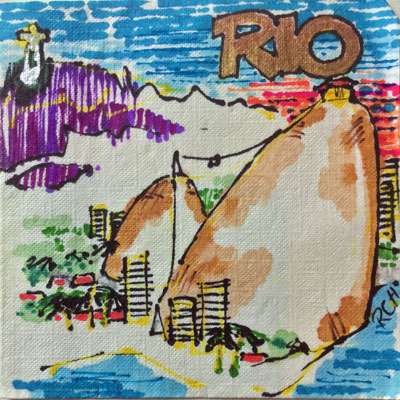
Sea Gull Cellar Bar Napkin Art, Roy Hoggard artist
Then, in a book review, The Shrugged Atlas by Geoff Nicholson, I was reminded of Itchycoo Park recorded by Small Faces. Listen carefully to the lyrics and see if you can find a connection to Blake’s quote above. Smile.

